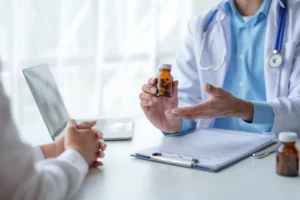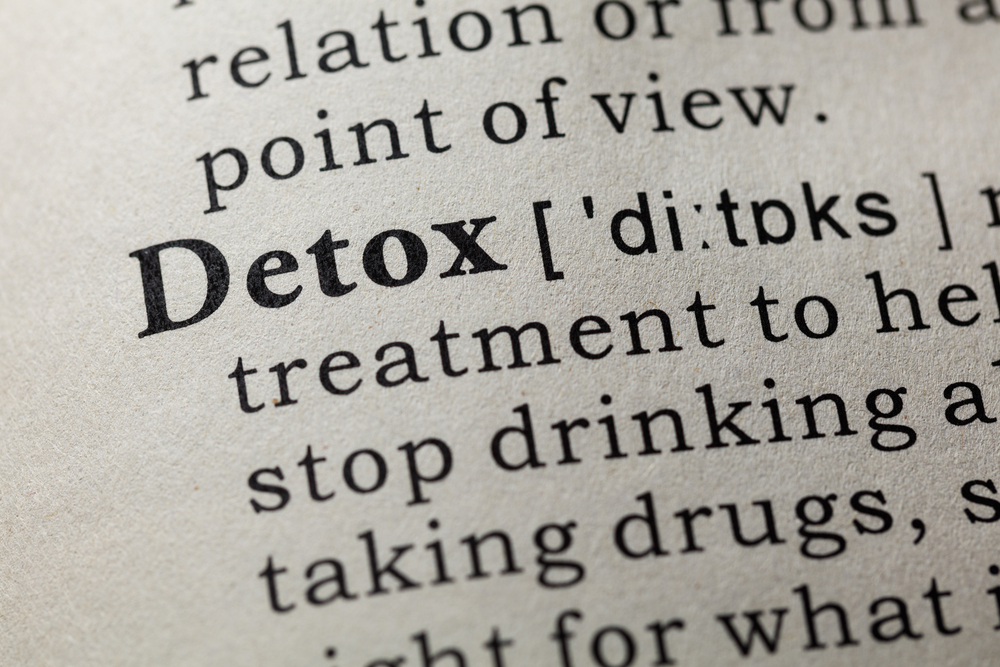Medical detox helps you safely withdraw from drugs and alcohol with the help of medications and 24-hour medical supervision. Detox staff closely monitor your vital signs and symptoms, administering medications as needed to alleviate withdrawal discomfort, curb cravings, and avoid dangerous complications.
The goal of medical detox is to clear your body of addictive substances so you can engage in rehabilitation focused on changing behaviors and making long-term lifestyle changes to support your recovery. Detox provides an essential starting point, but lasting sobriety requires ongoing effort and commitment to a comprehensive treatment plan.

Medications Used During Medically Assisted Detox
Going through detox is difficult, but medications can help ease withdrawal symptoms and cravings. Doctors typically prescribe a combination of drugs based on your needs.
- Anticonvulsants: Prevent seizures, which can occur during alcohol and benzodiazepine withdrawal. Common options are:
- Carbamazepine
- Valproic acid
- Gabapentin
- Vigabatrin
- Benzodiazepines: Manage anxiety and restlessness. Used cautiously and short-term, these include:
- Librium (chlordiazepoxide)
- Valium (diazepam)
- Ativan (lorazepam)
- Oxazepam
- Methadone: Part of treatment for opioid withdrawal. It reduces symptoms and cravings while blocking the euphoric effects of opioids.
- Phenobarbital: A barbiturate sedative is sometimes used for alcohol withdrawal. Use is declining due to risks.
- Buprenorphine: Blocks opioid withdrawal and cravings. Available as pills or injections.
Benefits of Medication-Assisted Detox
Medication-assisted detox offers several benefits over attempting to detox without medical help.
Lower risks of relapse after detox
With prescribed medications, detox symptoms like cravings, nausea, and insomnia are better managed, reducing the chances of relapsing during or after detox to seek relief. Medications provide a “buffer” against withdrawal discomfort, making the detox process less painful and the road to recovery more accessible.
Fewer painful or uncomfortable withdrawal symptoms
Prescription drugs can alleviate both physical and psychological withdrawal symptoms. Medications like buprenorphine reduce cravings and withdrawal discomfort, allowing you to focus on your recovery rather than constant discomfort. Anti-anxiety and anti-seizure medications address mental and physical health risks during detox.
Helps patients stay in treatment for longer
Medication-assisted detox leads to higher rates of patients continuing to rehabilitation and aftercare. When withdrawal symptoms are managed, motivation and commitment to long-term sobriety are easier to maintain. The medication also provides stability during detox so you can actively participate in counseling and therapies to build support for your recovery.
Help patients find and maintain employment.
Reduced withdrawal symptoms and health risks allow you to go about daily activities like work or school during and after detox. Medications provide mental clarity and physical ability to meet responsibilities that may have been neglected during addiction.
The Importance of Follow-Up Treatment After Detox
As the National Institute on Drug Abuse (NIDA) explains, detox is only the first step in the treatment process and is not enough to treat addiction on its own. Detox can help you safely withdraw from drugs so you can enter long-term treatment, but without continuing care after detox, you are prone to relapsing.
Entering an addiction treatment program after detox is essential to address the underlying issues, such as psychological or social problems, that led to your addiction. Without tackling these root causes, achieving lasting sobriety is difficult. Treatment may involve counseling, therapy, support groups, and learning strategies to avoid triggers and stay committed to recovery.
Without follow-up care, up to 90% of people relapse into substance use. But with treatment, support, and a commitment to change, you can overcome your addiction for life. The path is long, but the rewards of sobriety are well worth the journey. Detox is just the first step; now, keep walking.
Common Side Effects of Medical Assisted Detox
Going through medically assisted detox can produce some uncomfortable side effects as the drugs leave your body. But don’t worry, the medical staff will monitor you closely and provide medications to help relieve symptoms. Some common side effects you may experience include:
- Constipation: Opioids and other drugs can slow your digestive system, so constipation is common during detox. Drink plenty of water, eat high-fibre foods, and walk around as much as possible.
- Drowsiness: You may feel very sleepy during detox as your body adjusts. Get extra rest and sleep as much as possible. The medical team will wake you for vital checks, meals, and medications.
- Dizziness: As drugs leave your body, you may sometimes feel lightheaded or dizzy. Be very careful when walking or standing up. Ask for help if you feel unsteady. The medical staff will monitor your vital signs closely.
- Drug cravings: Cravings for the drugs you are using can be intense during detox. Medications and counseling help reduce cravings, but they may still arise. Talk to the medical staff right away if cravings feel unbearable.

Healing is a Continuous Process That Starts With Detox.
Healing from addiction is a lifelong journey that begins with detox. Detox, or detoxification, refers to the process of removing drugs and alcohol from your system. Medically-assisted detox helps make this difficult process safer and more comfortable.
Our caring medical staff at MD Home Detox provides 24/7 support and monitoring during detox. They utilize medications as needed to alleviate withdrawal symptoms like nausea, tremors, and cravings. This helps you avoid dangerous complications and stay focused on your recovery.
Call 1 (888) 592-7931 or contact us online to learn more about our detox and rehab programs. A new life free from addiction is possible – take the first step and call today.

